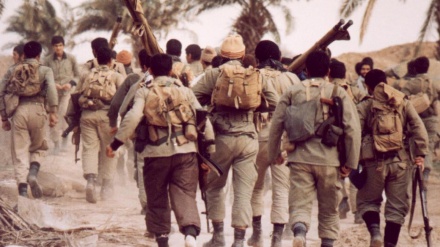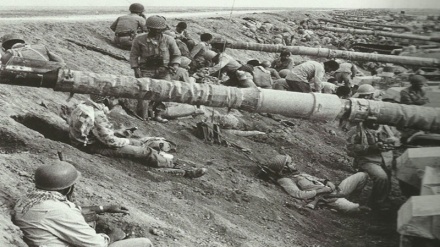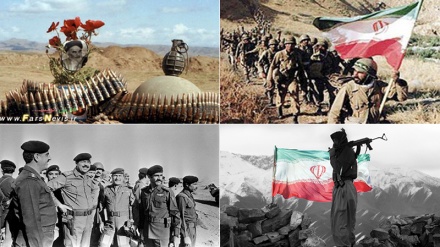Glimpses of Epic of the 8-Year Holy Defense (88)
Dear listeners, we have said several times that the Iraqi dictator Saddam’s main goal of initiating the 8-year war and invading Iran was to overthrow the Islamic Republic system. He pursued other goals, too. But, he and his masters in Washington, Moscow, Tel Aviv and Europe didn’t reach any of their goals.
In this episode, we are going to dwell upon the role of national cooperation and empathy during the 8 years of war which resulted in the frustration of the enemies and victory of the Iranian people.
When the Iranian people alongside military forces entered the battlefield, the armed forces gained stronger morale for fighting and repelling the aggressive enemy. The armed forces trusted the people and vice versa. This trust turned into a real belief and played a very significant role in the final triumph of the Islamic Republic of Iran in the imposed war. As the Basij volunteer forces participated in the war, people from all walks of life and from various occupations felt their responsibility to take part in the war. Most of the Basij forces were young people with different specialties. Thus, the war theater was the arena for manifestation of different talents. In view of this, from among these volunteer forces, great commanders emerged like Martyr Hassan Baqeri, who had gone to the fronts as a journalist but turned into a genius in combat operations. Many of the scientific and technological Gordian knots of the war were opened by these very popular forces. Presently, too, Iran owes many of its great achievements and progresses to these people. If we look at the war from this aspect, we should say that many of the senior commanders of the Islamic Revolution Guards Corps and the Army, who played determining role in the war, were trained in the cultural ground of the Holy Defence. Although over 250,000 thousand of the best youths of Iran were martyred in the war, the future of the country has been guaranteed by these very motivated people.
The participation of Basij forces in the administration of cities and villages during the war solved many problems for the government. In fact, the Basij organization entered the arena of problems and made its utmost effort to remove obstacles on the way of the government and the people. The most outstanding feature of the Basij has always been its self-sacrifice and readiness for working whenever need arises. The Basij forces didn’t wait to become strong to fight. They fought to become strong. The manpower that emerged in the war firmly believed in Imam Khomeini’s famous phrase, “We Can”. The Iranian combatants created such values during the war that have rarely been seen in the wars in the world. They would compete for doing the hardest jobs. The Basij forces, especially the youths, had fought with their carnal and mean desires first. The battlefronts were the places of self0building and moral expurgation. The combatants would never backbite or tell a lie. They refrained from having grudges against each other. They would never calumniate one another. They would avoid showoff, i.e. they would do everything for God’s sake and not for becoming famous or being praised by others. The higher a combatant was in military rank, the humbler he would become. In view of this, many times the commanders would wake up at night to polish the boots of their forces or wash their clothes while they were asleep.
The battlefronts were the places of spirituality and hope in God. When one or some of the fellow combatants were martyred, others would try to keep the morale of the forces high and fresh.
There were innumerable cultural values in the 8-year Holy Defence. The war caused the spirit of not fearing of death prevail among people. Many people could see manifestation of the ayahs of the noble Qur’an. They could see that the blood of martyrs was enlivening and each martyr could revive dead souls among people to continue his path. Martyrdom-seeking and self-sacrifice had become the prevalent culture of the majority of the people. People highly esteemed their combatants and martyrdom was considered as an eternal dignity. People really believed in the Qur’anic ayah which reads, “And do not suppose those who have been killed in the way of Allah as dead; rather they are living receiving sustenance with their Lord.”
According to Imam Khomeini, “This ayah does not point to the life after this world, as all creatures will have some sort of life in the other world; rather it says that martyrs enjoy living with their Lord and enter Allah’s banquet.”
In short, the Holy Defence was a unique period in which all divine values and moralities materialized and were palpably present in the society.
RM/SS


